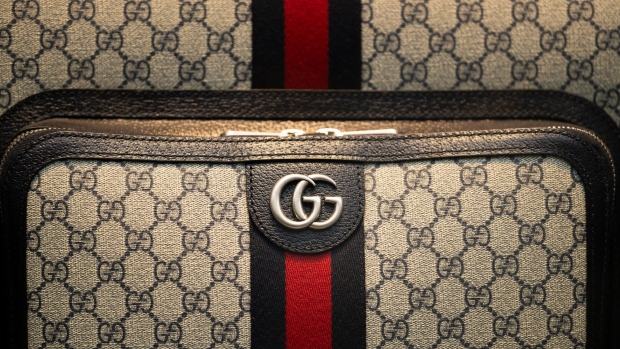Feb 8, 2024
Gucci Sales Fall as Weakness Persists at Kering’s Top Label
, Bloomberg News

(Bloomberg) -- Gucci sales fell in the final months of last year as the Italian label owned by Kering SA struggled to lure more wealthy shoppers to its pricey Double G belts and Princetown slippers.
Comparable revenue at Gucci fell 4% in the fourth quarter, Paris-based Kering said Thursday, while also warning that a key measure of group profit will fall this year.
“We are focusing on revitalizing Gucci,” said Kering’s chief executive officer, Francois-Henri Pinault, describing 2023 as a trying year which didn’t meet the group’s expectations.
Kering shares rose as much as 5.6% in Paris as some investors were reassured that Pinault is focused on fixing Gucci — which contributes about two-thirds of group profit — and that the label’s performance wasn’t even worse. The stock has lagged behind larger French rival LVMH this year.
“The numbers were bad, but not horrible,” said Luca Solca, analyst at Sanford C. Bernstein. “This level of underperformance was expected.”
Gucci named a new designer a year ago to reinvigorate the brand. Sabato De Sarno presented his debut collection at Milan fashion week in September, the same month Gucci’s CEO, Marco Bizzarri, left the company after eight years in the role.
Products Gucci unveiled in September will arrive in stores in coming weeks, Kering’s chief financial officer, Armelle Poulou, told reporters Thursday.
Read more: Sabato De Sarno’s Gucci Debut Shows Miniskirts, Platform Loafers
Efforts to revive Gucci come as makers of luxury goods adjust to more subdued spending levels by their well-heeled clientele after demand soared coming out of the pandemic. Consulting firm Bain estimates the industry will grow by up to 4% this year, half of last year’s pace.
Still, results last month from Cartier owner Richemont and LVMH, whose brands include Louis Vuitton and Christian Dior, showed that the strongest brands have remained resilient amid the slowdown. Hermes International is expected to show higher sales when it publishes earnings Friday.
Read more: LVMH’s Resilient Sales Ease Concerns Over Luxury Market Slowdown
At Kering, recurring operating income for the group tumbled 15% to €4.75 billion ($5.12 billion) last year, falling short of analysts estimates. Pinault warned that Kering’s investments in its labels — which also include Balenciaga — will put pressure on the group’s results in the short term.
The luxury company predicted that recurring operating income this year will post a decline from 2023, particularly in the first half, and said it will remain “vigilant and disciplined with regards to its cost structure.”
Kering’s share price recovery is probably premature, according to Jefferies analyst James Grzinic, who said figures at the start of 2024 in China, in particular, will face tough comparables to last year.
Read more: Richemont Bucks Luxury Slowdown Weighing On Top UK Rolex Seller
(Updates with analyst comments in fifth, last paragraphs)
©2024 Bloomberg L.P.


